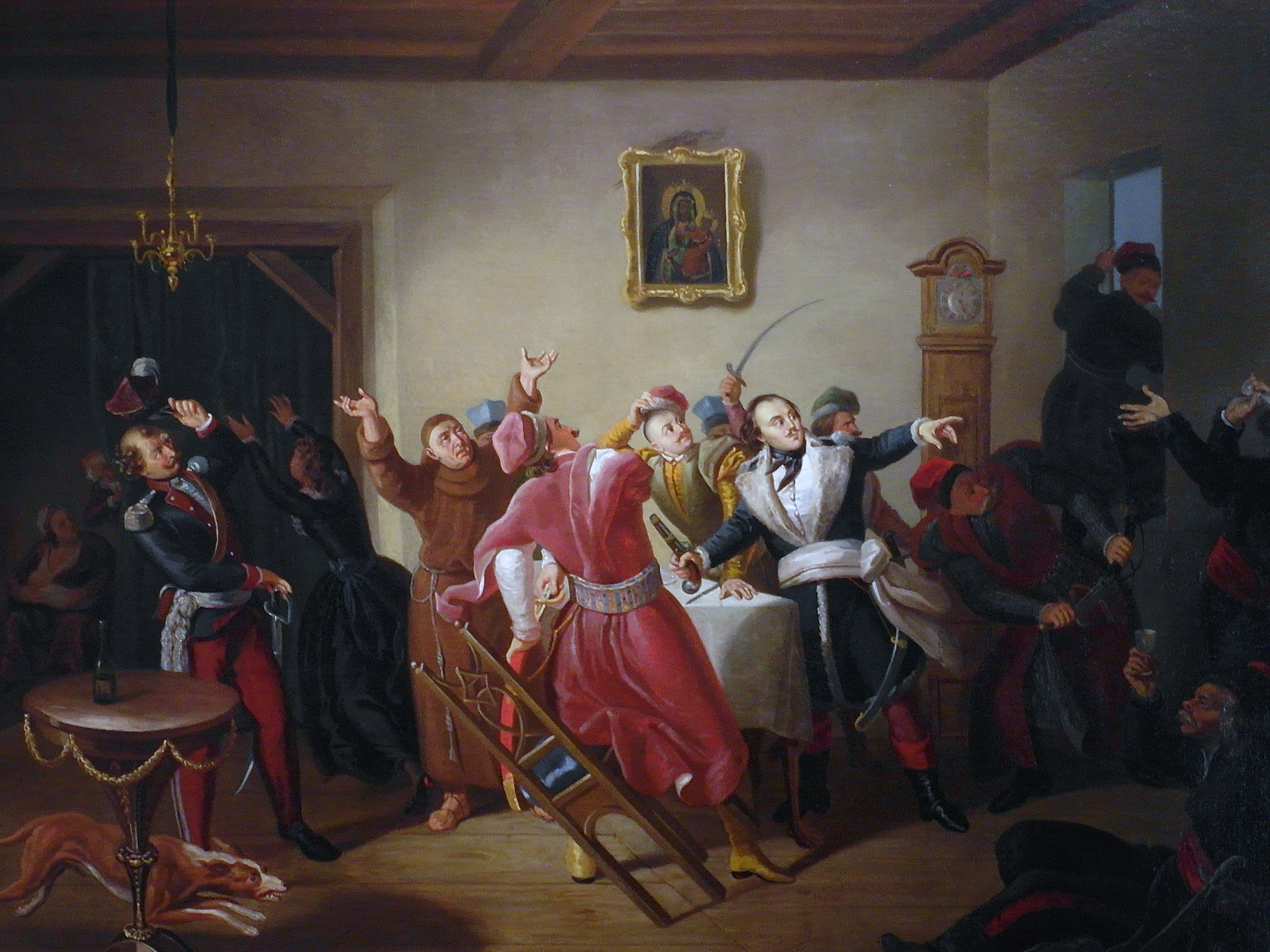Ewa Zientara: Why was the Bar Confederation formed?
Dorota Dukwicz: This question is only seemingly easy. In 1767 the Radom Confederates hoped that Russia would help them depose the hated King Stanisław II Augustus and move away the spectre of the demands made by the non-Catholic nobility, that is, dissenters, or dissidents, as they were called. Russia used and then abandoned the Radom Confederates, and that was the reason for the establishment of the Bar Confederation (Konfederacja Barska). The Radom Confederates were used not only to strengthen Stanisław II Augustus’ reign during the 1767—1768 Repnin Sejm, but also to bestow political equality on the dissident nobility. The decisive factor was that destruction of the hope of deposing Stanisław II Augustus and recalling the reforms which the King managed to introduce with the Familia’s support, beginning with 1764. Arriving for the Radom Sejm, opponents of Stanisław II Augustus hoped that their demands would be met. However, it soon turned out that Russia had completely different plans towards them. The Russian Ambassador, Nicholas Repnin, used the 1768 Sejm to strengthen Russian domination in Poland. The sessions took place under escort of Russian troops and the acts passed were aimed predominantly at strengthening the mechanisms of Russia’s interference in the Polish–Lithuanian Commonwealth’s internal affairs. Still before the Sejm’s end in February 1768, in a small non-defensive town in Podolia the betrayed malcontents formed a confederation, formally a revival of the Radom Confederation. The objective was to liquidate the dissidents’ political equality, which was regarded as an act in defence of the Catholic religion. There were also ideas to depose Stanisław II Augustus and restore the actually mythical republican form of government.
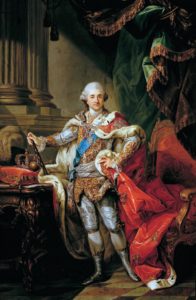
What influence did the peasant rebellion in the Ukraine have on the course of the Confederation?
Little, in fact. The Koliyivshchyna (Koliszczyzna), which you are asking me about, was the reason why on those terrains the Confederation was very quickly supressed or, bluntly speaking, drowned in blood. It seems to me, however, that that rebellion had little influence on the entire course of the Confederation and the later events. It was used by Russia to pacify the Confederation in the Ukrainian provinces of the Crown, but it had no major significance for the Bar movement, as the Confederation was soon reborn elsewhere — in Greater Poland and then in Lithuania. The Koliyivshchyna (Koliszczyzna) cost the life of thousands of Polish noblemen and peasants, but it had little political significance.
What was the society’s attitude towards the Confederates?
This is another question to which there is no one simple answer. Who made up that society? Are you asking me about the nobility or the peasants, whose villages were plundered by both Confederate and Russian troops? The nobility did not have a uniform attitude towards the Confederation. Contrary to what history textbooks often claim, it was not a mass movement of the nobility and not everybody supported it. The matter was more complicated. One has to remember that it was established in a country where Russian troops were stationed and that attempts to pacify the Confederation were also made by Polish troops under Branicki’s command. There is no doubt that the Confederation enjoyed more support in places where the Confederate troops were stationed and where Russian troops were absent, that is, closer to the Austrian or Turkish border. But in his monumental study Konfederacja barska [Bar Confederation] Władysław Konopczyński does describe instances when the nobility gave a cold welcome to the Confederates.
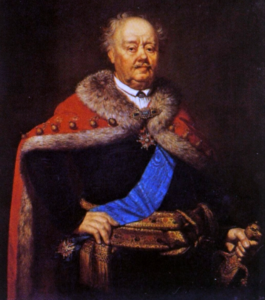
Of course, I am referring here to the politically active nobility, because it must be clearly said that not all noblemen participated in local government assemblies (sejmiki) or were interested in what was happening in the Commonwealth. Some nobility was focused entirely on the life of their granges, as centres of their most vital interests. Support for the Bar movement was greater in the areas where the local political leaders were actively engaged on the Confederation’s side. The Confederation was not always a spontaneous activity. For instance, Ogiński’s uprising in Lithuania, staged during the later period of the Confederation, was carefully prepared. This means that it was preceded by agitation and that its participants had to be assembled and prepared not only militarily, but also ideologically. They had to believe in the ideas for which they were to risk their life. Consequently, it is difficult to talk about nobility’s uniform attitude towards the Confederation.
What were the relations between the Confederates and the King? Why did the Confederates decide to depose and then kidnap Stanisław II Augustus?
This is yet another simplistic picture perpetuated by school textbooks. For it is not true that the Confederation was unanimously against Stanisław II Augustus. The path from signing the Confederation Act, through the announcement of the first and then the second interregnum acts, to the King’s kidnapping was winding. In fact, from the very beginning there were two currents in the Confederation. The one associated predominantly with Teodor Wessel was a movement of republicans from the former Saxon camp, which uncompromisingly aimed at Stanisław II Augustus’ dethronement. By contrast, the Bar Confederates centred on Bishop Adam Krasiński, and predominantly the Bishop himself, from the beginning sought a possibility of cooperation with the Czartoryskis and Stanisław II Augustus. At some point there was a real possibility of such cooperation. It seemed that little was needed for the Czartoryskis’ private militias to cross to the Confederation’s side. The King also made attempts to reach an agreement with the Bar Confederates, not only in the Commonwealth, but also with the help of those he trusted, that is, through the agency of the French court. It seemed that the possibility of creating such a ‘national front’ against Russia was real, particularly that during 1769–1770 Stanisław August and the Czartoryskis made an unsuccessful yet very determined attempt, which ended tragically, to liberate their policy from Russia. One of the motifs of the royal policy of coming closer to the Bar Confederates was the intention to become free of the overwhelming influence of the Russian Ambassador to Warsaw.
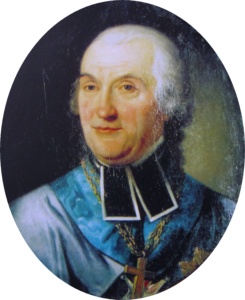
There were two basic factors that eventually prevented Stanisław II Augustus from cooperating with the Confederates: the interregnum act and the gravaminum manifesto, issued by the Bar Generality (Generalność), which condemned the Czartoryskis. That happened when Krasiński was very close to the Familia and it seemed that Russia had lost control over the course of events in the Commonwealth. The Russian Ambassador, Mikhail Volkonsky, did not manage to form a counter-confederation to take control over the whole country like that organised by the Czartoryskis did in 1764. It occurred that there were not enough people willing to form an anti-Bar pro-Russian confederation. The King and the Czartoryskis were triumphant. It seemed that they managed to achieve independence. But then came the news about the first interregnum act, followed by the gravaminum manifesto and then the October main act of interregnum, which basically ruled out a possibility of cooperation. In practice that meant that the Confederation’s radical anti-royal wing won the upper hand in the Bar Generality and, using a method of quick movements, prevented Krasiński from reaching an agreement with the King.
Was the Bar Confederation a sine qua non of the First Partition of Poland? Or would it have happened anyway?
It remains unknown whether the Partition would have taken place had it not been for the Bar Confederation. Probably yes, but possibly not at that moment, but a little later. This question should be reformulated: was the Bar Confederation the reason for the Partition? And this question has recurred basically since the late 18th century, when people began to write about the First Partition, at first in a parascientific manner, and then in a truly scientific way. Even today certain scholars are inclined to believe that the Bar Confederation was the reason for the Partition. In my opinion this is not true. The cause for the First Partition was the international distribution of power which made it necessary to defuse the tensions in the Berlin-Vienna-Petersburg triangle, connected with the Russo-Turkish War; and that was done at the Commonwealth’s expense. The other cause lay in the Commonwealth itself, and it was not so much about the Bar Confederation, but rather Russia’s losing its dominant position in Poland. I am convinced that the most important reason why Russia opted for the Partition was the collapse of the control system developed by Ambassador Nicolaus Repnin. One has to bear in mind that Russia alone could not make that decision. The King and the Czartoryskis’ plans to overthrow Russia’s dominance and achieve independence made Russia unable to pacify the Commonwealth independently. The King’s resistance along with the Bar Confederation prevented Russia from bringing the Commonwealth fully under control again.
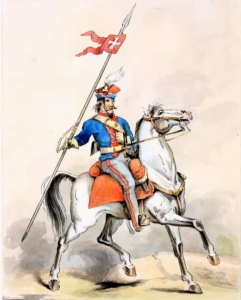
It was somewhat surprising for me to learn that the Russian diplomatic correspondence between Petersburg and Warsaw during 1769–1771 devoted relatively little space to the Bar Confederation. From the Russian point of view the main problem was the unwavering stance of the King and the Czartoryskis. Their attempt to become independent was so dangerous to Russia that at some point an idea to dethrone Stanisław II Augustus was born. It was given up, but when Russia realised that it would not be able to deal with the Commonwealth alone, it accepted Prussian suggestions about the partition. Russia decided to allow Prussia to take part in the pacification of the Commonwealth. In practice that meant that the partition, in which Russia also took part, was the price it had to pay for the Prussian help in subordinating Poland. The whole thing could not take place without Austria. In that way Russia opted for the partition, which gave it two things: a possibility of taking control over the internal situation in the Commonwealth and a chance to defuse the tensions in the relations between the three empires.
How is the Bar Confederation assessed in Polish historiography? It is often linked to conceptions such as religious fanaticism and backwardness, but it is also regarded as the first pro-independence struggle.
You have basically answered your own question. There is no uniform assessment of the Bar Confederation. I think that the most trustworthy are the assessments made by those who study sources from that epoch. These scholars know those people best and they know what they believed in and what they thought. Personally speaking, I agree with Władysław Konopczyński who basically perceives the Confederation as the first attempt to achieve independence. I do not, however, have such an emotional attitude towards the Confederation as he does. I am much more appreciative of the emancipation attempts made at that time by Stanisław II Augustus and the Czartoryskis. Nevertheless, from the Bar Confederates’ point of view theirs was a struggle for independence. In my opinion accusing them of religious fanaticism is ahistorical. The Repnin Sejm upset the religious status quo in the Commonwealth by forcing the nobility to give equal political rights to the non-Catholic nobility even though Catholicism was dominant. And such motivation is perfectly understandable to me.
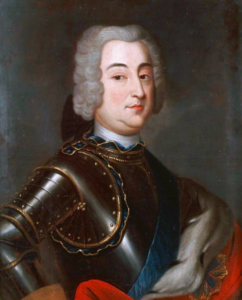
But one has to bear in mind that the whole thing was not motivated by pro-independence efforts as we understand them today. Personally I find it difficult to have a very favourable attitude towards the Confederation due to its radical wing, which disproved not only of certain reforms essential for modernising the country, but also of Stanisław II Augustus. On the other hand, I know perfectly well that the Confederation was an attempt to throw off the Russian yoke, which was also what the King was trying to achieve, though in a more prudent way. The tragic nature of those events consisted in the fact that both those camps were doomed to failure. I believe that the Confederation should be evaluated also from the point of view of the tradition and development of the pro-independence thought. Together with the Constitution of 3rd May and the Kościuszko Uprising, the Bar movement is an element of the legend of the struggle for freedom, which, particularly during the Partitions, was tremendously important for the survival of our nation. Also today we should ‘dust’ the Bar Confederation and appreciate it more. I think that this is actually happening, also because of your Museum.
Dr Dorota Dukwicz — historian associated with the Tadeusz Manteuffel Institute of History of the Polish Academy of Sciences and editorial assistant of Kwartalnik Historyczny, her domain is the 18th-century history of Poland, particularly the Polish-Russian relations during the reign of Stanisław II Augustus and the First Partition of Poland.
Interviewer: Ewa Zientara

